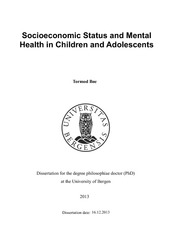| dc.contributor.author | Bøe, Tormod | |
| dc.date.accessioned | 2014-01-24T08:54:08Z | |
| dc.date.available | 2014-01-24T08:54:08Z | |
| dc.date.issued | 2013-12-16 | eng |
| dc.identifier.isbn | 978-82-308-2446-7 | eng |
| dc.identifier.uri | https://hdl.handle.net/1956/7697 | |
| dc.description.abstract | Socioeconomic disadvantage in childhood is related to both immediate and persisting impairments in mental health and well-being. Findings from epidemiological studies suggest that children who grow up in families with a lower socioeconomic status (SES) have more symptoms of mental health problems, compared to those raised in more affluent families. The overall aim of the current thesis was to expand the knowledge of the socioeconomic distribution of childhood mental health problems by conducting detailed investigations of how indicators of socioeconomic status are associated with different domains of mental health problems. A second aim was to examine some of the potential mechanisms through which socioeconomic disadvantage may translate into mental health problems using a path analytical framework. In order to accomplish these aims, data from a large sample of 11-13 years old children who participated in the Bergen Child Study was utilized. In Paper I, the aims were to investigate whether there are general inverse relationships between indicators of socioeconomic status and different domains of mental health problems, and to determine whether specific indicators of socioeconomic status were associated with particular dimensions of mental health. The findings confirmed an inverse relationship across all the symptom dimensions. Poor family economy consistently predicted the mental health problems investigated, while parental level of education predicted externalizing problems stronger than internalizing problems. In Paper II, the aims were to investigate the association between familial socioeconomic status and children’s sleep problems, and to assess the role of sleep problems as a potential mediator of the association between familial socioeconomic status and childhood mental health problems. It was found that sleep problems were significantly more common in socioeconomically disadvantaged children, and that having difficulties initiating and/or maintaining sleep partially mediated the association between poor family economy and mental health problems. In paper III, the aims were to investigate associations between family economy, parental level of education, parental emotional well-being, and parenting practices. An additional goal was to assess whether associations between SES indicators and internalizing or externalizing child mental health problems were mediated through parental well-being and parenting practices. The findings were generally supportive of a model where parental emotional well-being and parenting practices mediated the associations between indicators of SES and mental health problems in children. Overall, the findings from the three papers comprising this thesis suggest that mental health problems and sleep problems are distributed according to familial socioeconomic status, with more problems for those who are socioeconomically disadvantaged. Furthermore, sleep problems, as well as parental emotional well-being and parenting practices may influence the association between familial socioeconomic status and childhood mental health problems. | en_US |
| dc.language.iso | eng | eng |
| dc.publisher | The University of Bergen | eng |
| dc.relation.haspart | Paper I: Psychiatry Psychiatr Epidemiol (2012) 47:1557–1566, Tormod Bøe, Simon Øverland, Astri J. Lundervold, Mari Hysing, Socioeconomic status and children’s mental health: results from the Bergen Child Study. Copyright Springer-Verlag 2011. Full-text not available in BORA due to publisher restrictions. The article is available at: <a href="http://dx.doi.org/10.1007/s00127-011-0462-9" target="blank">http://dx.doi.org/10.1007/s00127-011-0462-9</a> | eng |
| dc.relation.haspart | Paper II: Journal of Psychosomatic Research 73 (2012) 430–436, Tormod Bøe a, Mari Hysing, Kjell Morten Stormark, Astri J. Lundervold, Børge Sivertsen, Sleep problems as a mediator of the association between parental education levels,perceived family economy and poor mental health in children. Copyright 2012 Elsevier Inc. Full-text not available in BORA due to publisher restrictions. The article is available at: <a href="http://dx.doi.org/10.1016/j.jpsychores.2012.09.008" target="blank">http://dx.doi.org/10.1016/j.jpsychores.2012.09.008</a> | eng |
| dc.relation.haspart | Paper III: Tormod Bøe, Børge Sivertsen, Einar Heiervang, Robert Goodman, Astri J. Lundervold, Mari Hysing, Socioeconomic status and child mental health: The role of parental emotional well-being and parenting practices. Preprint. The article is available here: <a href="http://hdl.handle.net/1956/7699" target="blank">http://hdl.handle.net/1956/7699</a> | eng |
| dc.title | Socioeconomic status and mental health in children and adolescents | eng |
| dc.type | Doctoral thesis | |
| dc.rights.holder | Copyright the author. All rights reserved | |
